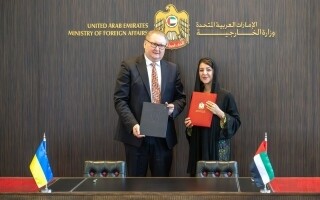
ADNOC has signed a Sales and Purchase Agreement (SPA) with Osaka Gas, one of Japan's largest utility companies, for the supply of liquefied natural gas (LNG) from ADNOC's Ruwais LNG project. The 15-year agreement converts a previous Heads of Agreement into a definitive agreement and marks the first long-term LNG sales agreement between ADNOC and Osaka Gas.
Under the terms of the agreement, LNG cargoes sourced primarily from the Ruwais LNG project in Al Ruwais Industrial City, Abu Dhabi, will be shipped to the destination ports of Osaka Gas and its Singapore-based subsidiary. The project, scheduled to start commercial operations in 2028, is set to provide lower-carbon gas to meet the increasing global demand.
Rashid Khalfan Al Mazrouei, ADNOC Senior Vice President, Marketing, stated, "This agreement with Osaka Gas reinforces our long-standing energy partnership with Japan and supports our strategy to expand our global LNG footprint." The long-term SPA will see the delivery of up to 0.8 million tonnes per annum (mtpa) of LNG, contributing to ADNOC's established energy partnership with Japan.
The Ruwais LNG plant, operating on clean power, aims to be one of the world's lowest-carbon intensity LNG facilities. The SPA with Osaka Gas follows ADNOC's successful offering of 3.1 billion shares in ADNOC Gas to institutional investors, boosting liquidity and free float and diversifying the shareholder base.
ADNOC's global LNG expansion strategy includes the Ruwais LNG project, with 8 mtpa of the 9.6 mtpa capacity already committed to customers in Asia and Europe. The project, featuring two 4.8 mtpa liquefaction trains and leveraging advanced technologies for safety, efficiency, and emissions reduction, will significantly increase ADNOC Gas' operated LNG production capacity to around 15 mtpa.
Keiji Takemori, Osaka Gas Executive Vice President, emphasized the historical relationship between Abu Dhabi and Osaka, expressing the importance of the new agreement with ADNOC. The Ruwais LNG plant's operation on clean power will position it as one of the lowest-carbon intensity LNG facilities globally, ensuring a stable energy supply for customers.














